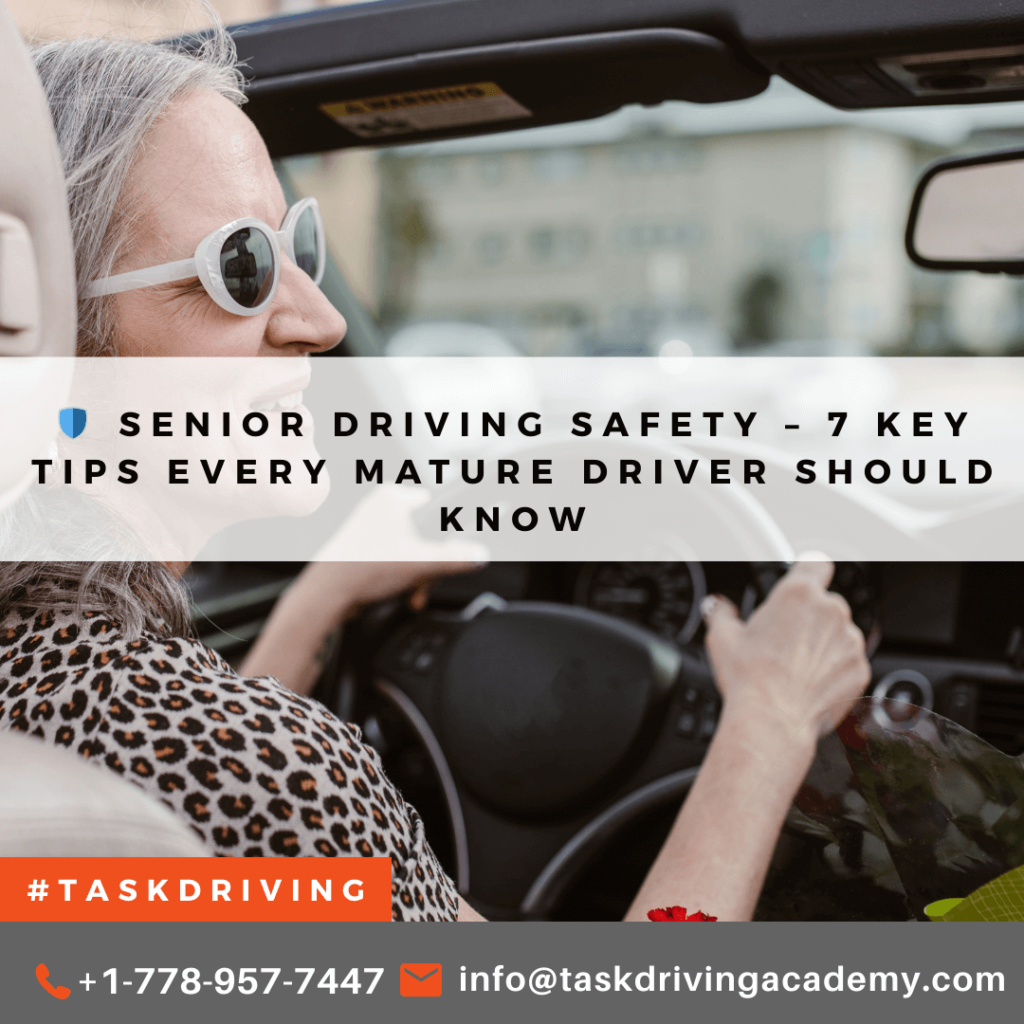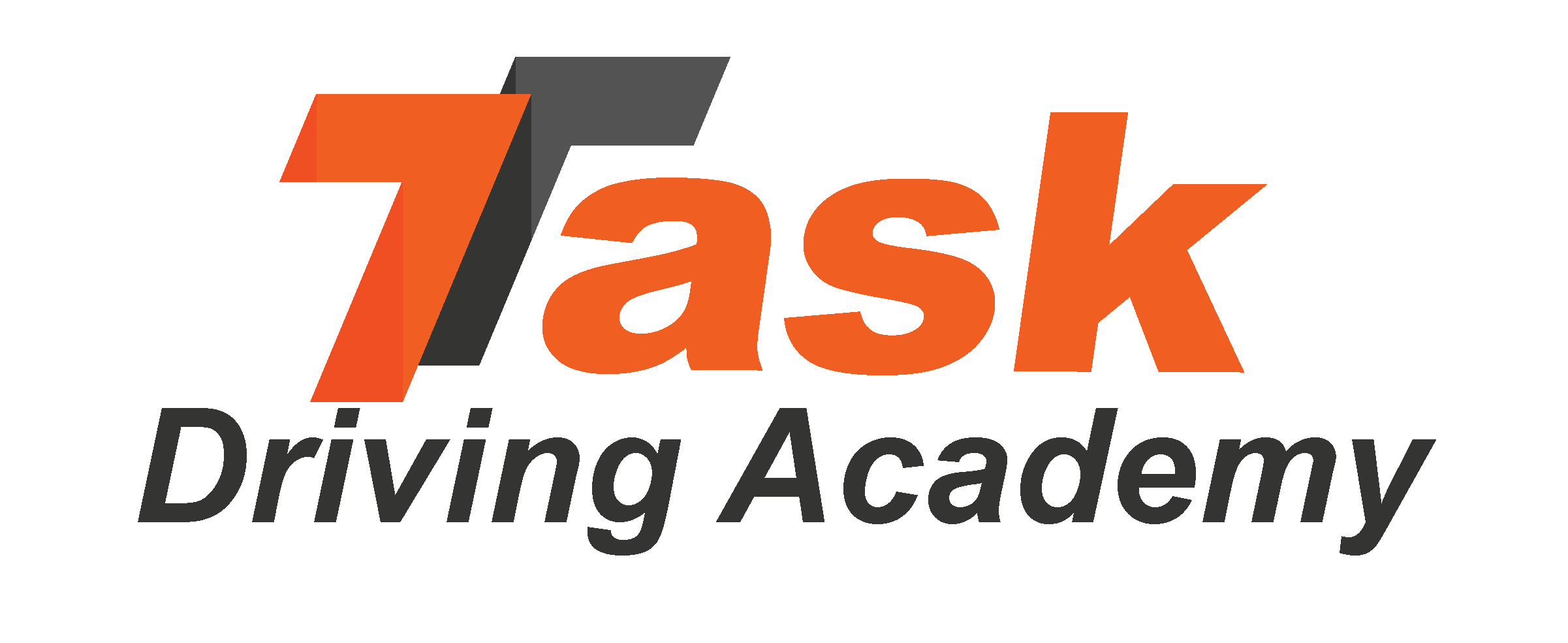Senior Driving Safety is more important than ever for mature drivers who want to stay safe and independent on Vancouver’s roads. With age, changes in vision, reaction time, and mobility can affect driving performance—even for experienced drivers.
This guide provides seven essential tips to help mature drivers stay safe, confident, and legal behind the wheel. It’s endorsed by local driving schools and health professionals for anyone seeking senior driver road safety advice.
Table of Contents
🚦 1. Schedule Regular Vision and Hearing Tests
As part of safe driving for elders, maintaining optimal vision and hearing is critical:
- Visit an optometrist at least once a year.
- Ensure you can clearly see road signs, pedestrians, and traffic signals.
- Check for age-related hearing loss, which can affect your ability to hear horns, sirens, or approaching vehicles.
Poor vision or hearing may require prescription glasses, hearing aids, or driving at daytime only.
🧩 2. Recognize and Respond to Physical Changes
Aging affects reaction time, flexibility, and neck mobility. To maintain senior driving safety:
- Perform simple neck and shoulder stretches daily.
- Use adjustable seats and mirrors so you can easily check blind spots without turning too far.
- Consider a steering wheel spinner knob if hand strength is limited.
These adjustments improve control and reduce fatigue during long drives.
🎯 3. Avoid Driving During Challenging Conditions
Mature drivers should be proactive about minimizing risk:
- Skip driving in heavy rain, snow, or during rush-hour congestion in downtown Vancouver.
- Avoid driving at dusk or dawn, when glancing sun can impair vision.
- Limit highway driving if merging, maintaining speed, or lane changes feel stressful.
Assessing road conditions and timing drives for clearer, quieter roads improves driving safety for elders.

🕒 4. Plan Routes and Take Regular Breaks
Planning ahead helps you stay in control:
- Use GPS or map-based route planning to avoid busy areas.
- Schedule breaks every hour to stretch and refresh your focus.
- Choose well-lit and familiar roads when driving in West Vancouver, Burnaby, or Richmond.
Rest stops can rejuvenate your concentration and boost alertness.
📚 5. Refresh Skills With a Refresher Driving Lesson
Refreshing your knowledge through a mock test or lesson can increase confidence:
- Book a session with a trusted local school like Task Driving Academy for senior driver road safety training.
- Practice lane positioning, merging skills, hazard perception, and parking on real Vancouver routes.
- Learn current ICBC rules, such as pedestrian right-of-way laws or changes in speed zones.
Staying up-to-date helps you stay competent and confident.
👁️ 6. Know the Warning Signs and Adapt When Needed
Honest self-assessment ensures safety and independence:
- Watch for confusion about routes you used to know.
- Notice slower reaction times when braking or accelerating.
- If you feel fatigued, frustrated, or overwhelmed, it may be time to restrict driving or seek alternatives like public transit or rideshare.
Recognizing signs early helps you adapt and stay secure on the road.
✅ 7. Use Adaptive Devices and Stay Informed
Simple adaptations can make all the difference:
- Add blind-spot mirrors or backup cameras to improve visibility.
- Keep an up-to-date GPS system that clearly announces directions.
- Stay informed about ICBC’s mandatory eyesight rules and road test standards.
🛑 Conclusion: Maintain Independence With Safe Senior Driving
Adopting Senior Driving Safety habits ensures that mature drivers remain independent while staying safe on Vancouver roads. With a proactive mindset, ongoing self-assessment, and modern tools, seasoned drivers can continue driving confidently for years.
🧑🏫 Need Personalized Guidance?
At Task Driving Academy, we offer customized refresher driving lessons and senior driver road safety workshops to help you or a loved one stay sharp behind the wheel.
📞 Call us at 778‑957‑7447 or visit taskdrivingacademy.com to schedule a session.
❓ FAQ – Senior Driving Safety
Q: How often should seniors retake vision and hearing tests?
A: At least annually, or more frequently if changes are noticed.
Q: Are lesson costs covered by ICBC?
A: Not typically. However, seniors might qualify for discounted rates or programs—ask your instructor.
Q: Can I add adaptive devices to my car for the ICBC road test?
A: Yes—devices like blind-spot mirrors and backup cameras are allowed and encouraged.
